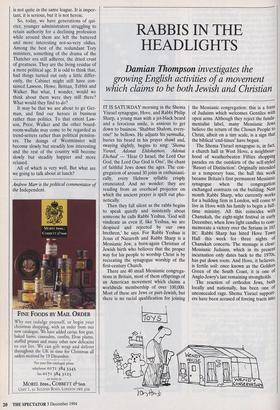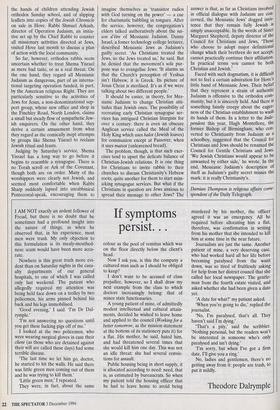RABBIS IN THE HEADLIGHTS
Damian Thompson investigates the
growing English activities of a movement which claims to be both Jewish and Christian
IT IS SATURDAY morning in the Shema Yisrael synagogue, Hove, and Rabbi Philip Sharp, a young man with a jet-black beard and a ferocious smile, is anxious to get down to business. Shabbat Shalom, every- one!' he bellows. He adjusts his yannulka, buries his beard in his prayer shawl and, swaying slightly, begins to sing: `Shema Yisrael, Adonai Ehlohaynoo, Adonai Ehchad' — 'Hear 0 Israel, the Lord Our God, the Lord Our God is One', the chant of faithful Jews down the ages. The con- gregation of around 30 joins in enthusiasti- cally, every Hebrew syllable crisply enunciated. And nd wonder: they are reading from an overhead projector on which the ancient prayer is spelt out pho- netically.
Then they fall silent as the rabbi begins to speak quietly and insistently about someone he calls Rabbi Yeshua. 'God will vindicate us even if, like Yeshua, we are despised and rejected by our own brethren,' he says. For Rabbi Yeshua is Jesus of Nazareth and Rabbi Sharp is a Messianic Jew, a born-again Christian of Jewish birth who believes that the proper way for his people to worship Christ is by recreating the synagogue worship of the first-century Church.
There are 40 small Messianic congrega- tions in Britain, most of them offsprings of an American movement which claims a worldwide membership of over 100,000. Most of these are Jews or part-Jewish, but there is no racial qualification for joining the Messianic congregation: this is a form of Judaism which welcomes Gentiles with open arms. Although they reject the funda- mentalist label, many Messianic Jews believe the return of the Chosen People to Christ, albeit on a tiny scale, is a sign that the biblical 'end-times' have begun.
The Shema Yisrael synagogue is, in fact, a church hall in West Hove, a neighbour- hood of weatherbeaten Fifties shopping parades on the outskirts of the self-styled 'Resort of Distinction'. Originally intended as a temporary base, the hall this week became Britain's first permanent Messianic synagogue when the congregation exchanged contracts on the building. Next month Rabbi Sharp, who currently works for a building firm in London, will come to live in Hove with his family to begin a full- time ministry. All this coincides with Chanukah, the eight-night festival in early December, when Jews light candles to com- memorate a victory over the Syrians in 165 BC. Rabbi Sharp has hired Hove Town Hall this week for three nights of Chanukah concerts. The message is clear: Messianic Judaism, which in its present incarnation only dates back to the 1970s, has put down roots. And Hove, it believes, is fertile soil: once known as the Golders Green of the South Coast, it is one of Anglo-Jewry's last remaining strongholds. The reaction of orthodox Jews, both locally and nationally, has been one of unconcealed rage. Shema Yisrael support- ers have been accused of forcing tracts into the hands of children attending Jewish orthodox Sunday school, and of slipping leaflets into copies of the Jewish Chronicle on sale in Hove. Rabbi Shmuel Arkush, director of Operation Judaism, an initia- tive set up by the Chief Rabbi to counter all missionary activities directed at Jews, visited Hove last month to discuss a plan of action with the local community.
So far, however, orthodox rabbis seem uncertain whether to treat Shema Yisrael as mere bad taste, or as a real threat. On the one hand, they regard all Messianic Judaism as dangerous, part of an interna- tional targeting operation funded, in part, by the American religious Right. They are particularly sensitive to the activities of Jews for Jesus, a non-denominational sup- port group, whose new office and shop in the Finchley Road, North London, claims a small but steady flow of sympathetic Jew- ish enquirers. On the other hand, they derive a certain amusement from what they regard as the comically inept attempts by groups like Shema Yisrael to reclaim Jewish ritual and feasts.
Judging by Saturday's service, Shema Yisrael has a long way to go before it begins to resemble a synagogue. There is no Torah scroll or Ark of the Covenant, though both are on order. Many of the worshippers were clearly not Jewish, and seemed most comfortable when Rabbi Sharp suddenly lapsed into unrabbinical Pentecostal-speak, encouraging them to imagine themselves as 'transistor radios with God turning on the power' — a cue for charismatic babbling in tongues. After the service, however, the congregation's elders talked authoratively about the rai- son d'être of Messianic Judaism. Danny Israel, a fomer technology college lecturer, described Messianic Jews as Judaism's guilty secret. 'As Christians treated the Jews, so the Jews treated us,' he said. But he denied that the movement's sole pur- pose was to evangelise Jews: 'It alarms us that the Church's perception of Yeshua isn't Hebrew, it is Greek. Its picture of Jesus Christ is sterilised. It's as if we were talking about two different people.'
It should be easier, in theory, for Mes- sianic Judaism to change Christian atti- tudes than Jewish ones. The possibility of recreating early Christian synagogue ser- vices has intrigued Christian liturgists for over a century: there is even an obscure Anglican service called the Meal of the Holy King which uses halot (Jewish loaves) for communion except at Passover, when it uses matsot (unleavened bread).
The problem, though, is that such exer- cises tend to upset the delicate balance of Christian-Jewish relations. It is one thing for Christians to invite rabbis to their churches to discuss Christianity's Hebrew roots; quite another for them to start mim- icking synagogue services. But what if the Christians in question are Jews anxious to spread their message to other Jews? The answer is that, as far as Christians involved in official dialogue with Judaism are con- cerned, the Messianic Jews' dogged insis- tence that they remain fully Jewish Is simply unacceptable. In the words of Sister Margaret Shepherd, deputy director of the Council for Christians and Jews, 'Those who choose to adopt major definitional change which their brethren do not accept, cannot practically continue their affiliation. In practical terms you cannot be both Christian and Jewish.'
Faced with such dogmatism, it is difficult not to feel a certain admiration for Hove's little band of Messianic Jews. Their belief that they represent a strain of authentic Judaism is offensive to the orthodox com- munity, but it is sincerely held. And there is something faintly creepy about the eager- ness of the Christian establishment to wash its hands of them. In a letter to the Inde- pendent this year, Hugh Montefiore, the former Bishop of Birmingham, who con- verted to Christianity from Judaism as a schoolboy, suggested that the Council for Christians and Jews should be renamed the Council for Gentile Christians and Jews. 'We Jewish Christians would appear to be unwanted by either side,' he wrote. In the end, Messianic Judaism's description of itself as Judaism's guilty secret misses the mark: it is really Christianity's.
Damian Thompson is religious affairs corre- spondent of the Daily Telegraph.











































































 Previous page
Previous page